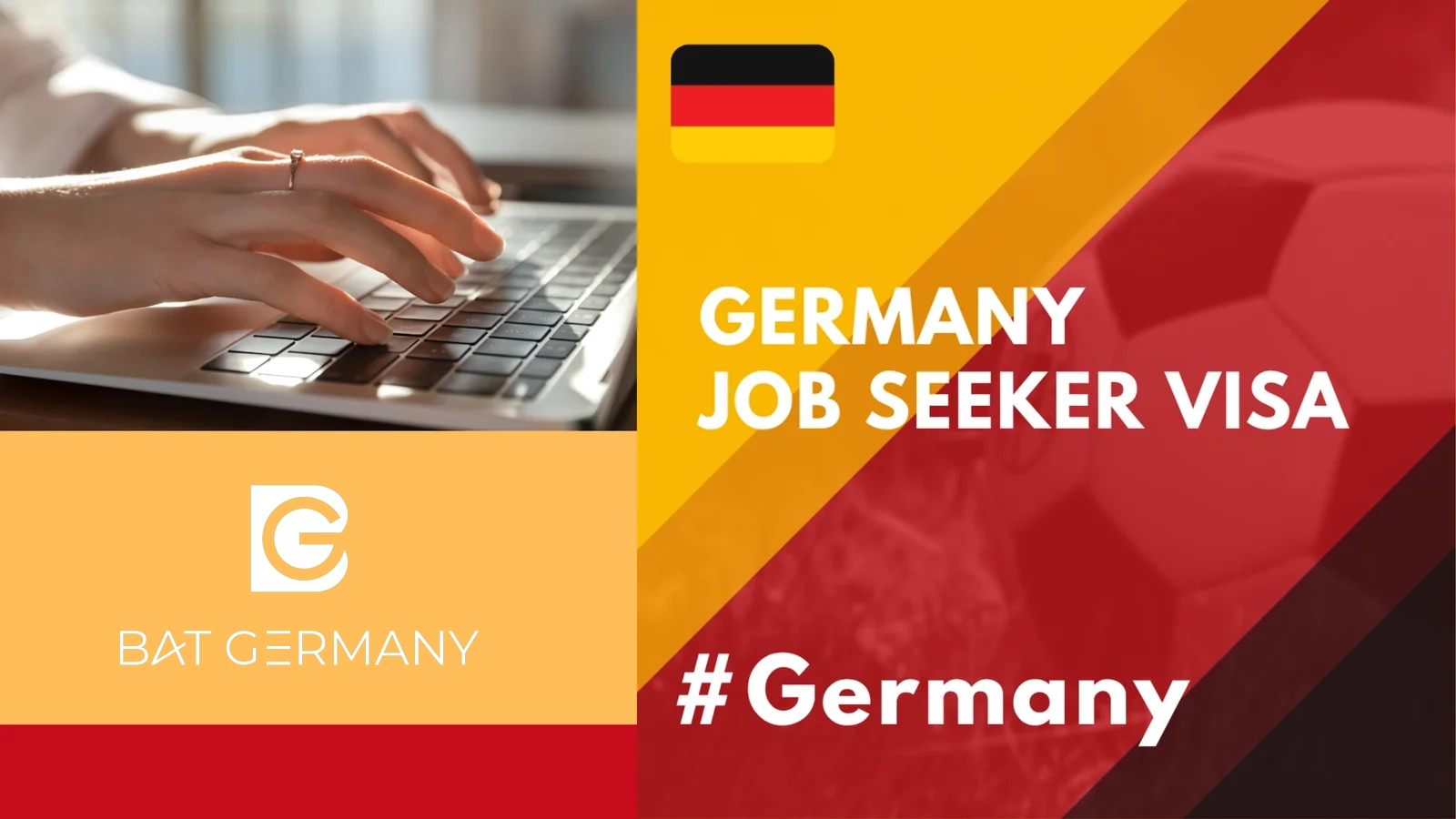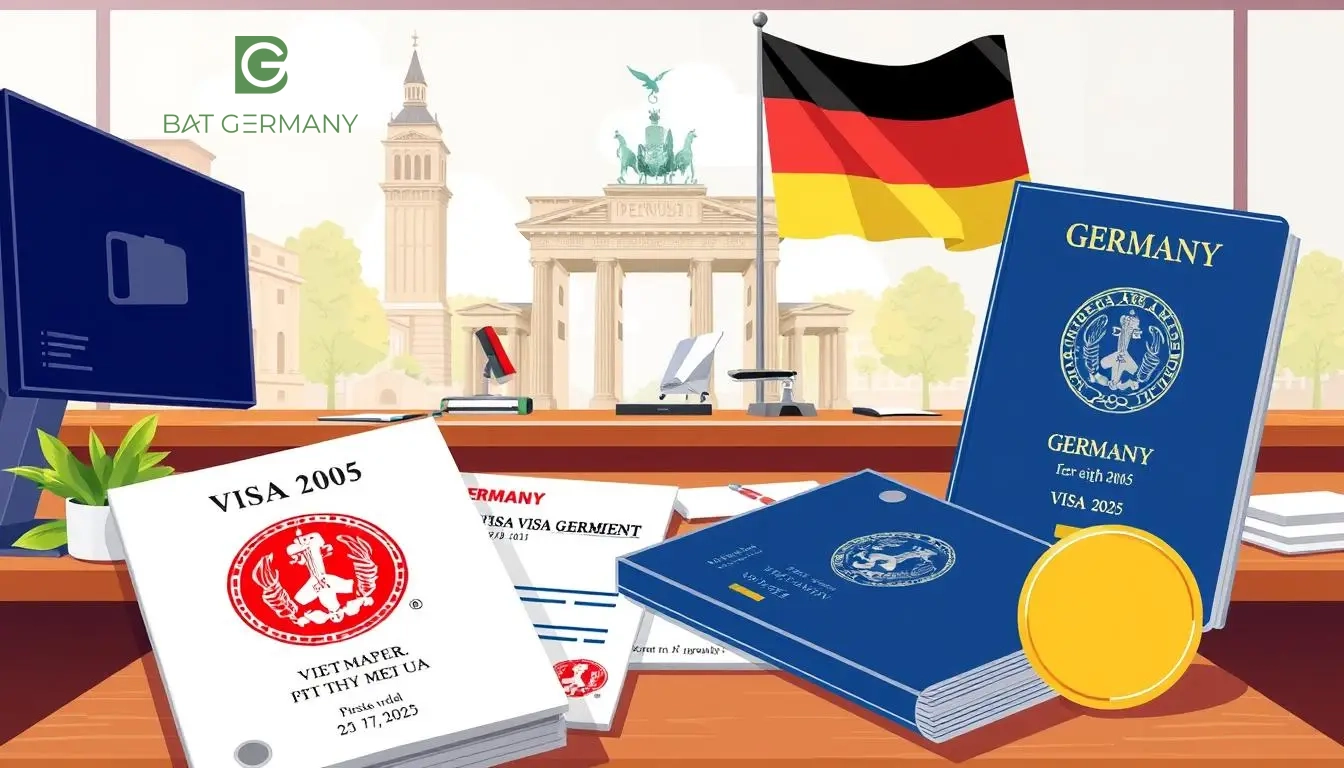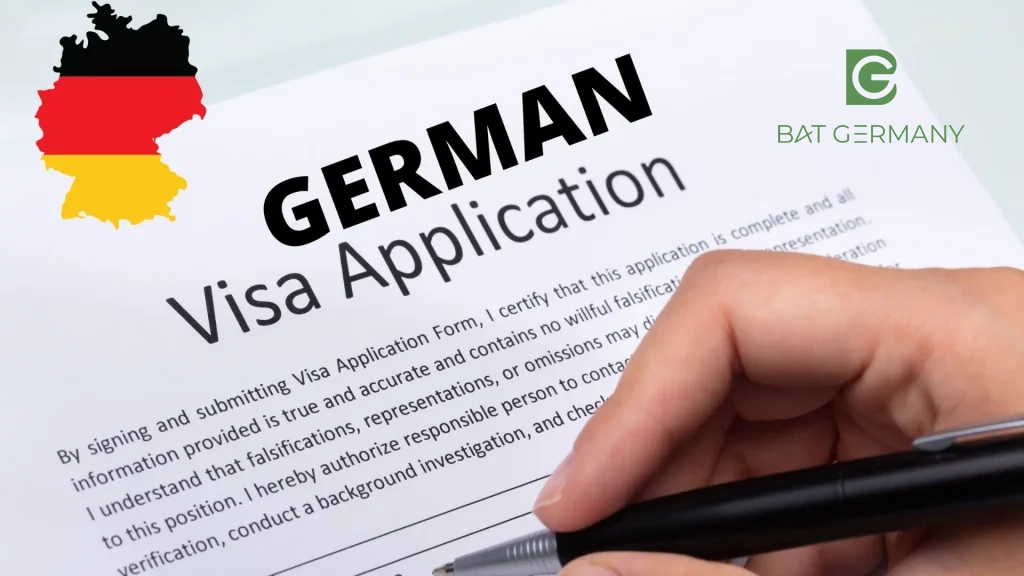In recent years, Germany has emerged as one of the most attractive countries for foreign workers. Europe’s largest economy is facing a shortage of skilled labor, especially in the medical, nursing, mechanical, engineering, hospitality, and service sectors. To solve this problem, the German government enacted the Skilled Immigration Act (Fachkräfteeinwanderungsgesetz), in which the visa §18a AufenthG — or visa 18a — is a key tool.

Visa 18a is designed for individuals who have completed a formal vocational training program in Vietnam or abroad and have a vocational degree that is recognized as equivalent to a German one. With this visa, you can go to Germany to work immediately in your trained profession, earn a stable salary, enjoy full social benefits, and, most importantly, open the door to long-term residency for yourself and your family.
1. How Is Visa 18A Different from 18B and Other Types?
The most important difference between visa 18a and 18b lies in the educational qualification. While 18b is for those with a college or university degree, 18a is for those with a vocational degree. This includes vocational training programs that lasted at least two years, such as nursing, electrical engineering technicians, mechanics, hospitality, chefs, metal cutting, machine operation, etc.
Unlike Ausbildung, which is a vocational training program in Germany for recent high school graduates, visa 18a allows people who already have a vocational degree from Vietnam or abroad to work in Germany immediately without starting from scratch. Compared to the EU Blue Card, visa 18a is also different: the Blue Card requires an academic degree and a high salary threshold, while 18a only requires a recognized vocational degree and a reasonable salary.
In summary:
- 18a: for skilled workers with a recognized vocational degree.
- 18b: for skilled workers with a college/university degree.
- Blue Card: for skilled workers with an academic degree and a high salary. Thus, visa 18a is the most practical path for skilled workers who have experience and want to start working in Germany immediately.
2. Policy Context and Opportunities for Vietnamese Workers
According to data from the German Federal Employment Agency, Germany currently lacks over 2 million skilled workers, especially in the healthcare, elderly care, hospitality, logistics, mechanical, and electrical engineering sectors. The German government is actively expanding cooperation with countries that have a young labor force, including Vietnam.

Vietnam is highly valued for its diligent, disciplined, and skilled workforce, while also having a close bilateral cooperation relationship with Germany in vocational training. Many pilot programs have been implemented, such as bringing Vietnamese nurses to Germany or cooperative projects in the engineering sector. This is a solid foundation for Vietnamese people to take advantage of visa 18a and legally enter the German labor market.
3. Conditions for Applying for a Visa 18a
To apply for a visa 18a, applicants need to meet the following conditions: First, you must have a formal vocational degree completed in Vietnam or abroad, lasting at least two years. This degree needs to be recognized as equivalent to a German vocational degree. The recognition process can be done through the Anabin database or by submitting a direct application to the relevant state’s professional recognition authority.
Second, you must have an official employment contract from a company in Germany. The job must be in the same profession you were trained in. For example, if you have a nursing degree, you need to work in healthcare facilities, hospitals, or nursing homes; if you have a technical degree, you must work in the mechanical, electrical, or construction sectors.
Third, you must have a reasonable salary according to regulations. This salary does not have a fixed number like the Blue Card but must be enough to ensure your living expenses in Germany. Typically, your employment contract will be reviewed and approved by the Federal Employment Agency (BA).
Fourth, regarding language skills, some industries require a minimum of B1 German (especially nursing and healthcare). Technical or service industries may be more flexible, but in general, having German language skills will make it easier to interview, work, and integrate.
Finally, for those over 45, the law requires proof of a higher minimum salary or proof of retirement provision to ensure long-term social security.

4. Professional Degree Recognition Process
The professional degree recognition process is the most important step when preparing for a visa 18a application. First, you need to determine if your profession requires recognition in Germany. If it does, you must submit an application to the professional recognition authority in the state where you will be working. The application typically includes your vocational degree, transcripts or training certificates, a description of the curriculum, a work experience confirmation letter, and certified translations into German.
The recognition authority will compare your training program with the corresponding vocational program in Germany. If they are fully equivalent, you will be granted full recognition. If there are differences, you may receive conditional recognition, meaning you might have to complete additional training or pass an exam to be officially recognized.
This process usually takes 3 to 6 months, depending on the complexity of the application. The cost ranges from 100 to 600 Euros. This is a mandatory investment if you want to apply for a visa 18a.
5. 7-Month Visa 18a Roadmap
The average time to prepare for a visa 18a application is about 6–7 months.
- Month 1: You should start by checking the recognition status of your degree. If needed, submit the application to the German recognition authority as soon as possible. At the same time, prepare a European-standard CV and a motivational letter.
- Month 2: Search for job opportunities in Germany through recruitment portals, consulting centers, or corporate partners. Participate in online interviews and negotiate work conditions.
- Month 3: After receiving a job offer, sign the official employment contract. This is a prerequisite for submitting your visa application.
- Month 4: Translate and notarize all documents, finalize the visa application, and book an appointment at the German Embassy.
- Months 5–6: Submit the visa application, provide biometrics, and wait for processing for 4–8 weeks. You may be asked to provide additional documents.
- Month 7: Receive your visa, enter Germany, register your residency (Anmeldung), open a bank account, get health insurance, and officially start working.
6. Preparation Costs and ROI Analysis
The cost of going on a visa 18a typically ranges from 150–300 million VND, including fees for degree recognition, translation/notarization, visa fees, flight tickets, health insurance, 2–3 months of initial living expenses, and German language training (if needed). If you use an all-inclusive service, the cost may be higher.
However, with an average starting gross salary of 2,300–3,300 Euros/month, you can quickly recoup your investment within a few months of working. For example, a nurse with a gross salary of 2,700 Euros (about 1,900 Euros net) can save 700 Euros/month after deducting living expenses of 1,200 Euros. In just about 6–8 months, you can fully recover your initial costs.
7. Salary and Benefits Under Visa 18a
The salary for visa 18a depends on the profession and region. The nursing and healthcare sectors typically have a gross salary of 2,400–3,000 Euros/month. Technical professions like mechanics, electricians, and construction workers earn from 2,800–3,500 Euros/month. The hospitality sector starts at 2,300–2,800 Euros/month.
In addition to salary, visa 18a holders are entitled to full social benefits, such as health insurance, pension, unemployment benefits, child allowance, and paid leave. This is a major advantage that helps you build a stable and long-term life in Germany.
8. Life in Germany on a Visa 18A
After arriving in Germany on a visa 18A, you will start working as an official employee. The company often supports you with initial administrative procedures such as residency registration, insurance, and taxes.
For housing, you can choose to rent a private apartment or a shared one (WG). Renting in major cities like Munich or Frankfurt can be difficult due to high costs and high demand, but costs are significantly lower in Eastern German states.
The work environment in Germany values punctuality, discipline, and responsibility. Germans are direct in their communication but also very respectful of colleagues. You should be prepared to adapt to this transparent and efficient workplace culture.
Outside of work, you can enjoy the high quality of life in Germany: a convenient public transportation system, a safe environment, opportunities to travel throughout Europe, and high-quality social services.
9. Long-Term Residency Pathway
Visa 18A not only allows you to work in Germany but also opens the door to residency. After 2–3 years of stable employment, you can apply for a long-term residency permit (Niederlassungserlaubnis) if you meet the insurance and language requirements. After 5 consecutive years of residency, you can apply for German citizenship, with the possibility of holding dual citizenship under new policies.
You also have the right to sponsor your spouse and children to join you. Your spouse is allowed to work legally, and your children can attend public schools tuition-free. This is a major advantage of visa 18a compared to many other labor export programs.
10. Common Mistakes and Tips for Success
Many applicants face delays or get their applications rejected because they did not thoroughly prepare for the degree recognition process, had incorrect translations, an unclear employment contract, or lacked health insurance when submitting their application. Some also book flights too close to their visa reception date, which risks missing their planned departure.
To increase your success rate, you should check for degree recognition early, standardize your CV to EU standards, practice for interviews, and clearly negotiate salary and benefits in your contract. Furthermore, prepare for at least 2–3 months of living expenses before coming to Germany to avoid financial pressure.
11. FAQ – Frequently Asked Questions
- What is the difference between visa 18a and 18b? 18a is for those with a vocational degree; 18b is for those with a college/university degree.
- Is German language mandatory for visa 18a? Many professions require B1, especially nursing and healthcare.
- How long does it take to process a visa 18a? 4–8 weeks from the date of a complete application submission.
- What is the salary for visa 18a? From 2,300–3,300 euros/month gross, depending on the profession and experience.
- Can I get long-term residency with a visa 18a? Yes. After 2–3 years, you can apply for long-term residency, and after 5 years, you can apply for citizenship.
- What if I lose my job while on a visa 18a? You will have a certain period (usually 6 months) to find a new job in your field; otherwise, your visa may be revoked.
Conclusion The German visa 18a is a suitable path for those with a recognized vocational degree who want to work immediately in Germany with a stable salary and full social benefits. This is not only an opportunity for personal career development but also opens up a long-term residency future for the whole family.
With a preparation time of about 7 months, a cost of 120–250 million VND, and a salary of 2,300–3,300 euros/month, visa 18a is an attractive choice for Vietnamese skilled workers in 2025 and beyond.
